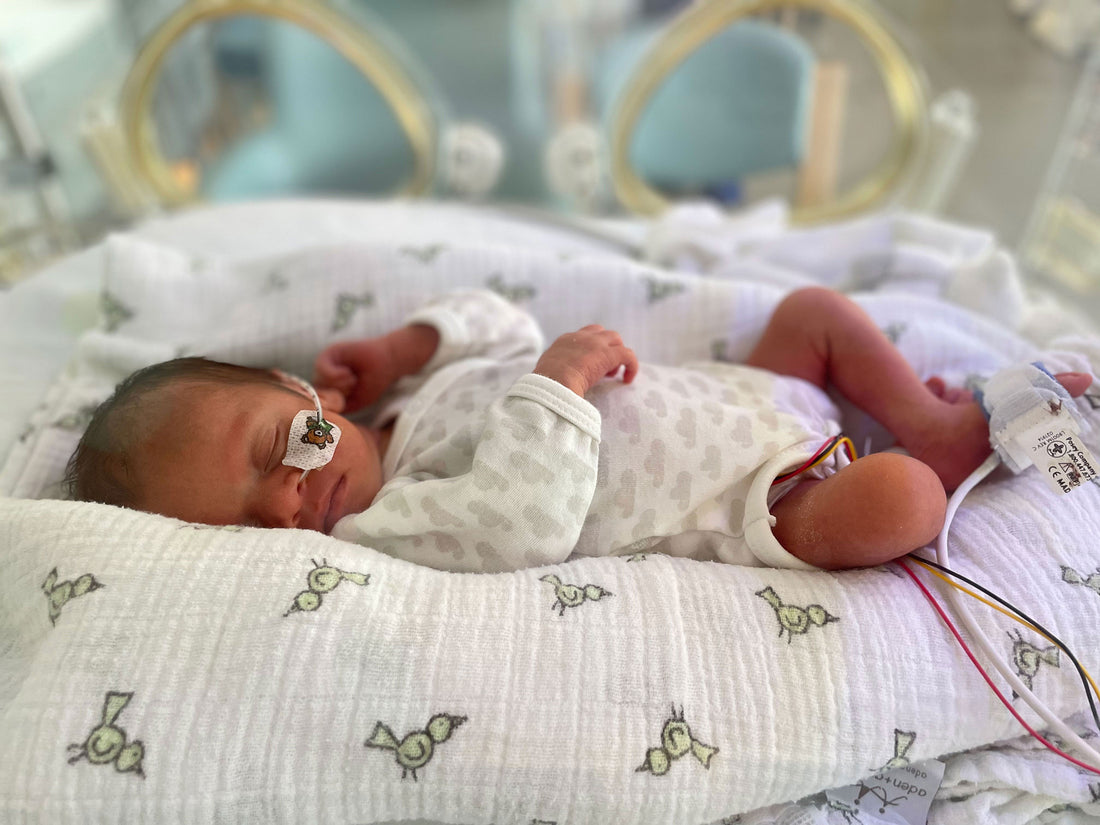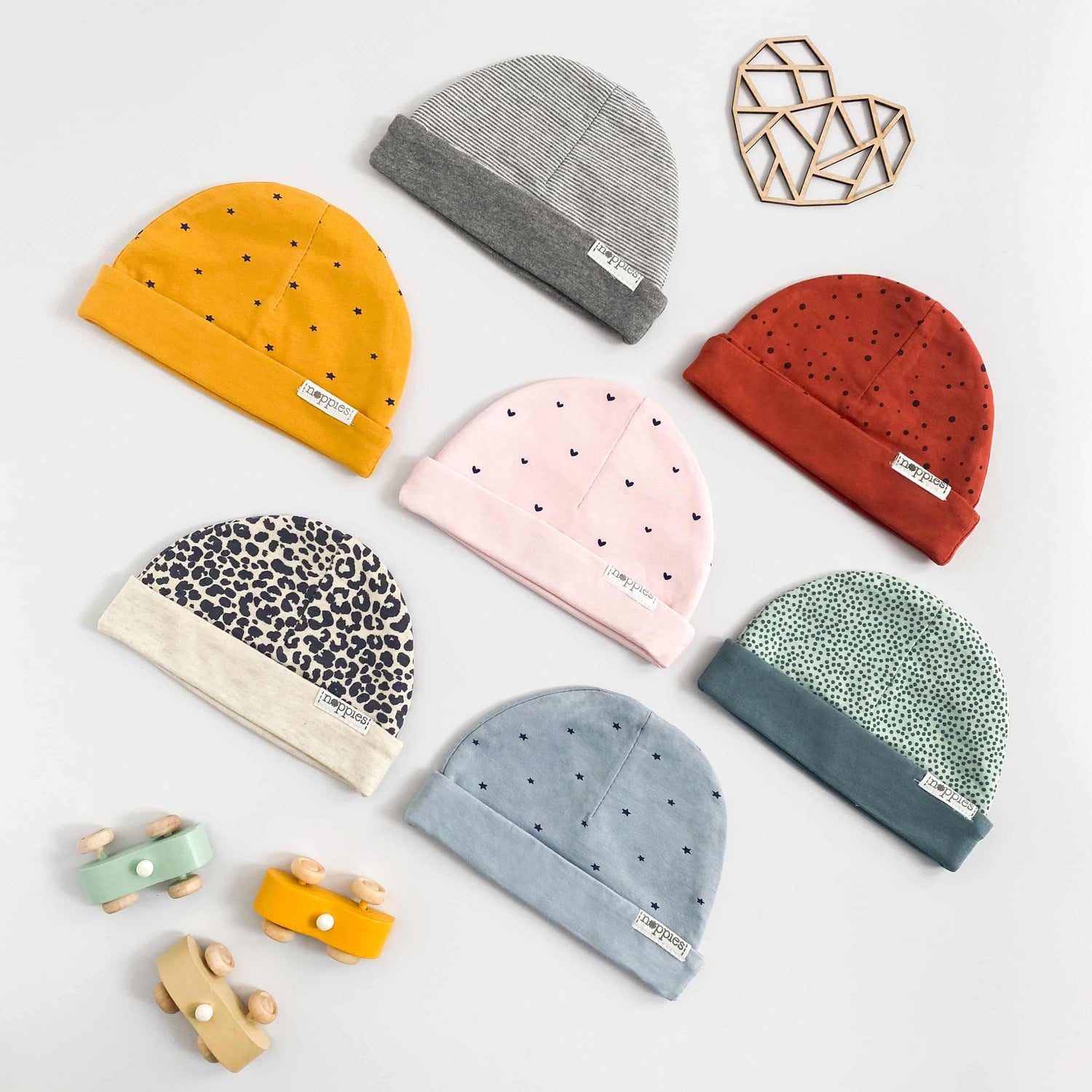
Advice on buying clothes for a premature baby in the NICU/SCBU
All parents dream of dressing their baby for the first time and have an outfit ready for the special occasion, but for parent’s of a premature baby that day can be delayed - especially if baby is on the NICU/SCBU.
This leads to the questions, what can a premature baby wear and when?*
Buying a Gift?
See our Gift Service along with Gift Buyer's Guide
Firstly, correctly fitting clothing is really important.
It is really important that baby clothes are snug, rather than too big and baggy, to help them maintain their own body temperature.

Where people sometimes complain of High Street premature baby size clothes being too big, we get lots of very positive feedback about the sizing of our specialist premature baby brands. We also have more micro-preemie sized items (1.5lb-3lb and 3lb-5lb) than anywhere else.
Layering
For premature babies that are venturing outside, it's recommended to dress baby in layers so clothing can be easily changed to adapt to the day.
Also ensure you have enough items for different stages of baby's first weeks or months, for varying temperature conditions, and so you can wash items regularly.
What clothing can a premature baby wear whilst in an incubator?
Before your baby is ready to be brought out of the incubator and into a cot, a lot of nurses like to trial them in little items of clothing, and turn the incubator right down - this gives us an understanding of how baby is at maintaining their own temperature.

Incubator vests
It is important that the clothes you pick won’t interfere with the lines that baby still has - which is what makes the incubator vests so special - they enable baby to be dressed with minimal disturbance, and are made of the highest quality material, they will be delicate on baby’s newborn skin.
Little Mouse stock plenty of fashionable, practical incubator vests which are perfect as a starting point for your baby’s wardrobe.
Sleepsuits, dresses, dungarees...
Depending on baby's individual circumstances, some babies in incubators can where specialist sleepsuits, bodysuits and even dresses and dungarees. For example, the Tiny & Small brand has these clothes with features to accommodate for wires and tubes.
Extubation mittens
The Goumi Stay-On Scratch Mittens have been clinically tested, and proven to reduce the rate of accidental extubation in the NICU. They have a two-part close system, which means they can grow as baby does. We recommend not having them on too tight, changing their position regularly, and giving baby’s hand a clean and a massage when they are not on - it is important for baby to have skin-contact, as well as being kept safe from pulling out essential wires.
What about clothing when baby is out for 'kangaroo care'?
Ask your nurses as advice will vary, but typically a baby out for cuddles could be dressed in more than just an incubator vest. We have a lot of items in 1.5lb-3lb and 3lb-5lb size, including sleepsuits, vests, dresses, dungarees, cardigans and more.

Hats are very important in the NICU too - a baby’s head is a large surface area, and loses a lot of heat very quickly.
Although baby may not always wear a hat in the incubator, it is important that you have a stock of hats, especially for kangaroo care, so your body can keep baby warm, and the hat can stop the heat from escaping.
As well as hats being important for kangaroo care, a blanket is important to keep you and your baby wrapped up, and we love a swaddle blanket or cellular blanket. Keep it in baby’s drawers under the incubator and have it on-hand for all those cuddles!
Sleepsuits, vests, dresses, dungarees, cardigans and more.
It will depend on the individual baby and NICU, but it is possible to buy lots of 'normal' baby clothing scaled down in size for these little ones.
What if baby is out of the incubator but still in the NICU/SCBU?
Babies that are not in an incubator have more choice of typical baby clothing. However if baby is still being monitored, it's important that the lines/tubes connected to baby can be done so appropriately and with minimal disturbance to baby.

Look out for brands like Tiny & Small, Fixoni and Itty Bitty Baby (use the filter to filter by Brand). Their micro-preemie clothing comes with slits in the side for feeding lines through, open feet for easily applying probes, and lots of wrap-around 'easy dress' style tops, vests, bodysuits, sleepsuits, dresses and even little outfits.
Choose footless sleepsuits
For a baby in the NICU/SCBU a sleepsuit without feet is recommended as it means its easier to change probes over without completely undressing your little one every time.
Is organic cotton essential?
Premature babies have delicate skin, and organic cotton is gentle and kinder to a baby's skin. There is less of a chance of baby developing skin conditions such as eczema, dermatitis and skin allergies. It is mould resistant and antimicrobial too. It's also better for the planet!

Many of our products are organic, but you do pay a premium for premium products, and we do sell a lot of standard cotton clothing with no complaints. It really is down to how sensitive baby's skin is, personal preference, and budget.
Use the "organic only" filter in a collection to see all the lovely organic cotton baby clothing we have.
The importance of anti-scratch & extubation mittens for a premature baby
Anyone who has a premature baby will know how much they like pulling at their wires - whether its whipping out their NG tube, or hanging onto their longline. The nurses will often try and make up a pair of scratch mitts, but there is no reason that you can't provide your own.

The Goumi Stay-On Scratch Mittens have been clinically tested, and proven to reduce the rate of accidental extubation in the NICU. They have a two-part close system, which means they can grow as baby does. We recommend not having them on too tight, changing their position regularly, and giving baby’s hand a clean and a massage when they are not on - it is important for baby to have skin-contact, as well as being kept safe from pulling out essential wires.
Shop baby clothing by size
*It's always important to get advice from baby's medical team regarding what baby can wear. Every baby is different and NICUs vary in their rules.


